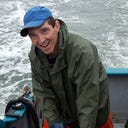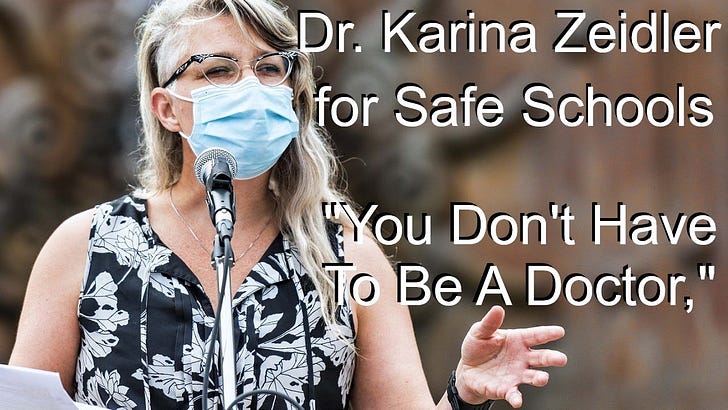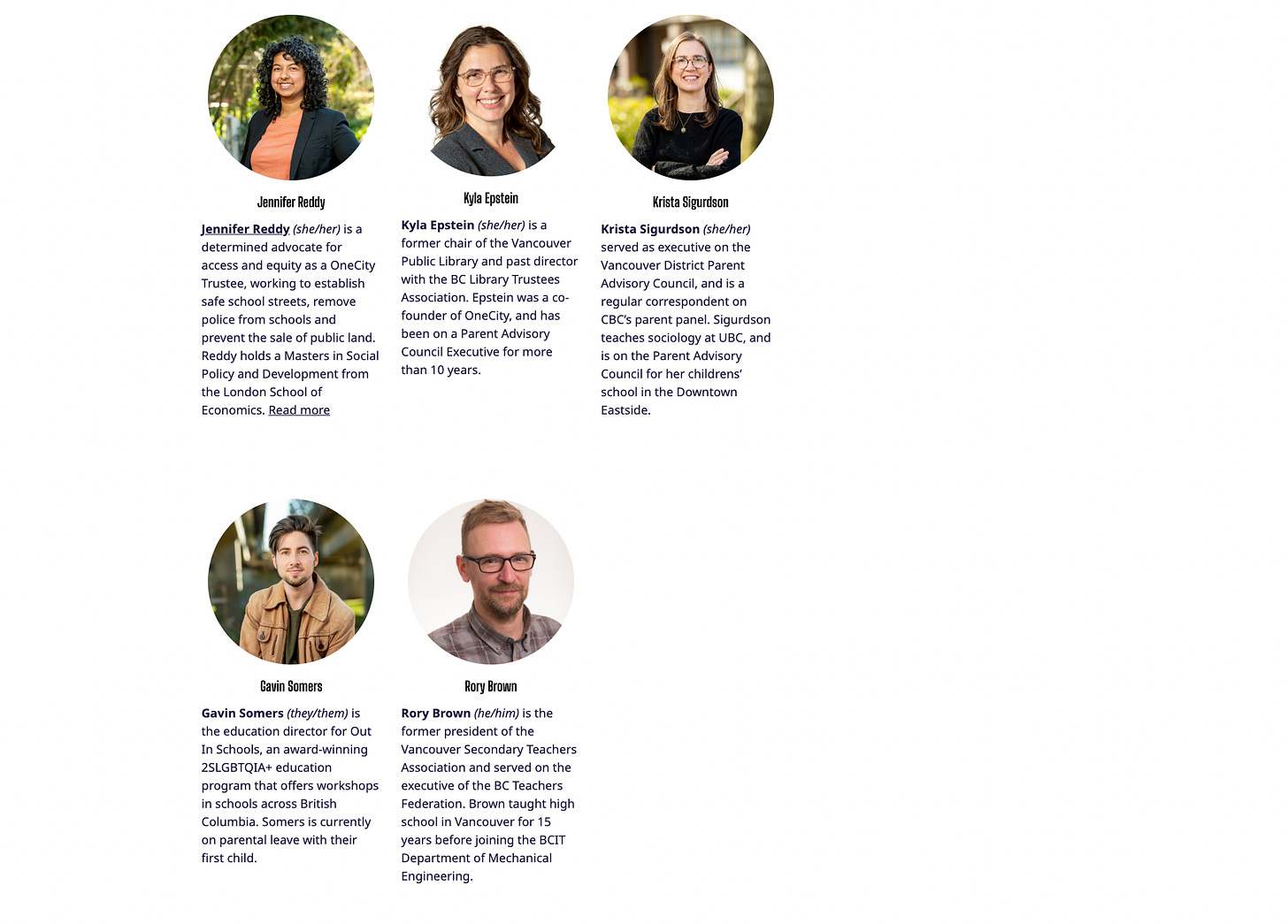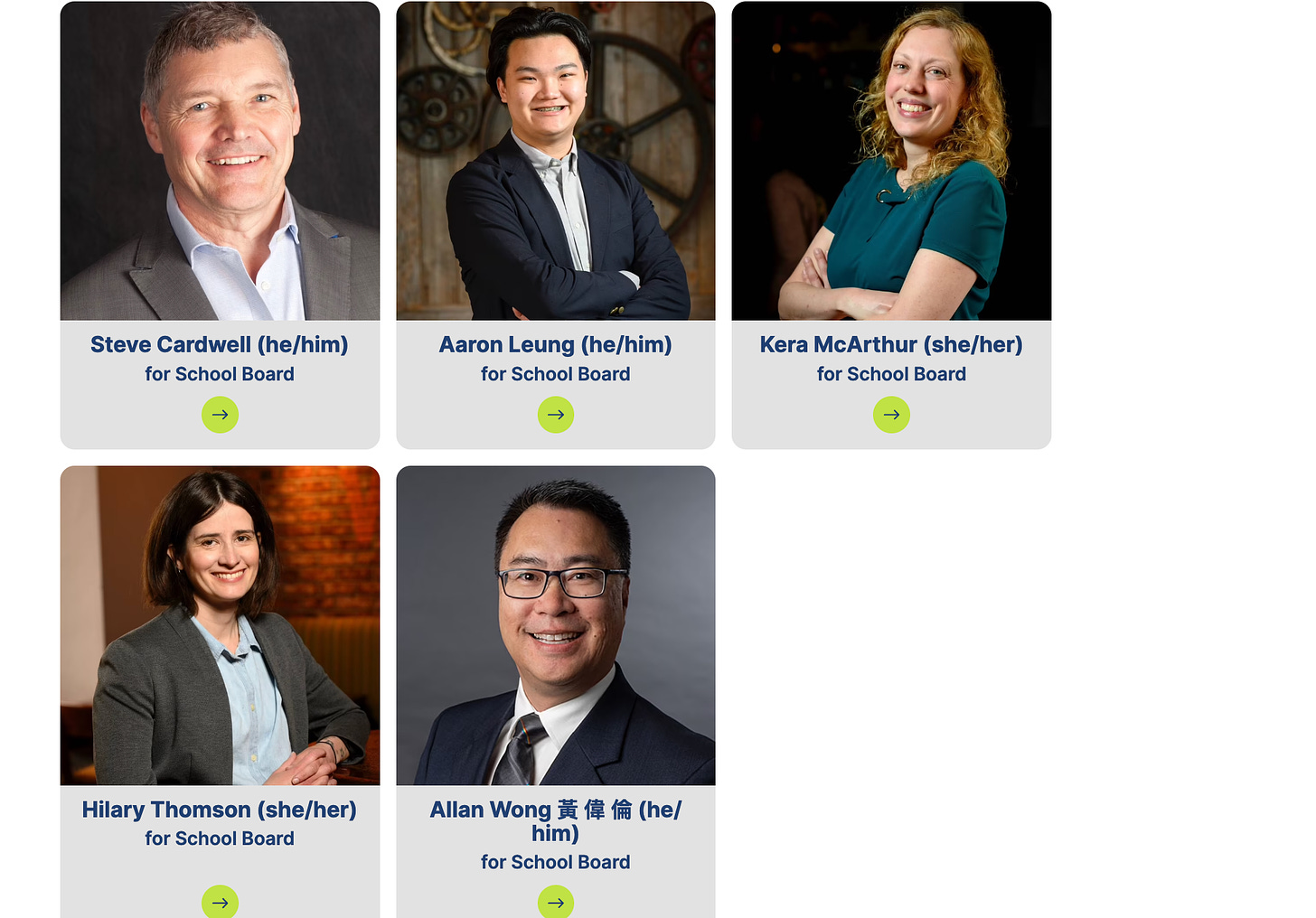

Discover more from A Campus Resident
School Board Choices - on the Left and Center.
UNA/UEL/UBC area residents who qualify can vote for Vancouver School Board trustees, Oct. 15, 2022.
All qualified electors living west of Blanca (UEL/UNA/UBC area) can vote in the municipal elections for Vancouver School Board trustees. Voting takes place on October 15, 2022. You can vote either at the University Hill Secondary School or the AMS' Nest in the center of campus. There are 30 candidates running for 9 positions, representing 8 political parties and a smattering of independents.
Disclosure: I used to be a member of COPE in the 1990s and early 2000s. I was a member of COPE’s education committee and worked with the trustees of the day. I even briefly flirted with the idea of running with COPE for school board. I was also a member of Vision briefly in the early 2000s, after leaving COPE, but left as Vision shifted right and COPE imploded. I do not currently belong to any of the civic parties.
This is the first of two stories being published this week on the political choices available for local area voters. Today’s story features the choices on the left: Vote Socialist, COPE, and One City; and Center: Vision and Green. Friday will discuss the choice on the right: ABC Vancouver, TEAM, and NPA.
I have asked each political grouping to send me a short explanation of why electors living in the UBC area might want to vote for them.
Parties on the Left
Vote Socialist
Vote Socialist is running one candidate, medical doctor Karina Zeilder. Zeilder has been at the forefront of anti-Covid activism, pushing or stronger mask mandates and criticizing the provincial public health provisions as inadequate. Zeidler "started her family practice in 2014 and has a particular interest in gender affirming care, sexual health, anti-opressive care, and reproductive justice.” Throughout the pandemic Zeilder has consistently advocated for stringent Covid controls.
In response to the request for a reason why to vote for her, Zeilder sent the following statement:
My main priority in running for school board is to bring back universal masking and to have clean air in schools. Schools should not be places that kids go to get sick. As a socialist, I believe that alone, individuals cannot protect themselves against an airborne communicable disease. Instead, we have a collective responsibility to protect our children, school staff and our communities, especially those who are most vulnerable. We also need free breakfast and lunch for all students, because you can't educate a hungry child. We need a district wide formal complaint process for racialized, sexual and gender based violence. We need to implement Indigenous educational autonomy. We need equal access and resources for all children. We need significantly more funding for schools, and we need to pay for it by taxing the rich and eliminating city funding and subsidies to private schools.
The Vote Socialist’s education platform includes a range of commitments, many of which are outside the purview of the school board to enact. That said, a school board guiding by the Vote Socialist platform would be a strong, equity-focussed, and productive learning environment.
COPE - Coalition of Progressive Electors.
COPE is one of the senior political parties in the election, formed in 1968. Its fortunes have waxed and waned over the years. Currently COPE has only one trustee on school board, Barb Parrot (who is not running for reelection). There have been moments in the past where COPE was the majority on the Board. This election COPE is running two candidates: veteran teacher Suzie Mah and educational assistant Rocco Trigueros. Both of whom are endorsed by the Vancouver and District Labour Council. The labour council represents 60,000 workers from over 100 unions.
Suzie Mah is a long time teacher and union activist. She describes herself as follows on the COPE candidate profile page:
Protecting and enhancing progressive and democratic movements is a core value for me. My 30 years plus professional and personal experience give me a deep understanding of how our school board and schools work. As a teacher union activist, I have fought for the rights of teachers and in doing so, protected the learning conditions for our students. I am a skilled collective agreement negotiator that has bargained both at the local and provincial levels. I have experience working on many school board committees, with trustees and officials, as an advocate to create policies that address sexism, racism, and employment equity. As a teacher, I have taught students from kindergarten to Grade 12 and adults in both face-to-face settings as well as online. I’ve taught in inner city schools and continue to witness growing poverty and its effects on children’s learning. Finally, as an east side parent, I watched my own son go through a system where every year from 2002, there were program and staffing cuts. I have an understanding from a parent’s perspective on how to advocate for support for children’s academic and emotional needs.
In response to the request for a reason why to vote for her, Mah sent the following statement:
I would encourage voters to vote for both myself and Rocco. Our calls to action include demanding more funding for public education, protecting neighborhood schools from closures, restoring library and visual and performing arts programs, implementing a universal meal program for all students, developing actions on mitigating climate change, engaging indigenous communities and taking direction from engagement, and implementing policies and procedures to ensure that our schools are inclusive, safe, and free from discrimination. We want a fully funded education system where we encourage and allow students to develop to their fullest potential.
Trigueros is a union activist and member of the group Socialist Alternative. He describes himself as follows on the COPE candidate profile page:
My professional life has been dedicated to children and youth. I worked for the City of Vancouver as a Latin Youth Worker for six years, creating safe spaces for immigrant youth in 15 secondary schools. Previous to that position, I helped run youth programs at Trout Lake Community Centre. I’m currently an Educational Assistant Level 3, specializing in children on the spectrum. Having worked in the school system for seven years, I’m aware of the many needs that students with learning disabilities encounter within public education, and have an understanding on how we can achieve better outcomes.
Currently, I am part of the CUPE BC committee Pink Triangle, where we pushed to end conversation therapy that affects many children nationally. I am also part of the CUPE BC international solidarity committee, where we started a national motion to stop the incarceration of immigrant children in Canadian detention centres.
My multicultural immigrant background, my belonging to the LGTBQ2S collective, and my work experience in the field of autism together make me sensitive to the education needs of children and families. As a School Trustee, I hope to be a strong, consistent, articulate advocate for children, families, teachers, and the public school system as a whole.
In response to the request for a reason why to vote for him, Trigueros sent the following statement:
“As a COPE candidate, my heart is in the well-being of students and their families, and also in providing the school staff with the best environment and working conditions in order to create a strong academic synergy. I am against school closures and selling of school lands in this critical moment, where our density is changing dramatically year after year.
As a democratically elected trustee, I will consult with students, parents, teachers and services providers before a decision is made.”
One City
One City is running five candidates, enough to hold a majority on school board if all their candidates are successful. They currently have one elected trustee, Jennifer Reddy, who is running for reelection. It’s a bold move to run five candidates with only one incumbent. Their confidence may be warranted as all five are endorsed by the Vancouver and District Labour Council. If ever there was a moment to be bold, this may well be that moment.
In response to the request for a reason to vote for One City, they sent the following statement:
OneCity believes neighbourhood schools are cornerstones of strong communities. To support families, we must expand childcare accessibility for before and after school, protect school board land from sale, meaningfully consult with host nations on land use decisions, and grow services provided in schools. From expanded library hours, anti-racism training for staff, increased public health services for students, planning seismic upgrading using relevant data, OneCity will make bold decisions and advocate to support families and schools.
For an earlier story about overcrowded schools I was able to speak to One City candidate Rory Brown face to face. If the other One City candidates are anything like Rory, then this could well be the strongest, most competent trustee slate on the block. Rory is a long serving teacher who spent several years as the president of the Vancouver Secondary Teachers’ Association. He currently is in teacher education at BCIT.
Our conversation centered on the problems with VSB’s current predictive modelling they use for facilities planning, but we covered way more ground than that. I had planned on a quick chat about the school crowding issue but found myself in a far longer, more detailed and wide ranging conversation about the importance of our publicly funded schools. I left the conversation thinking how fortunate we hare to have such publicly minded teachers who care so much they are willing to share their knowledge and time running for public office.
Parties in the Center
Vision Vancouver
Vision Vancouver emerged in 2005 after a bitter internal fight within COPE. Centrist elements of the NDP establishment have always had a rocky relationship with the more militant left-factions in COPE. Sometimes they cooperate (as in 2002 when Larry Campbell was elected to mayor as a COPE candidate, sometimes they break apart (as in the election that brought Mike Harcourt to power as a Civic Independent, 1980-1986). Currently the NDP faction is primarily supporting Kennedy Stewart’s Forward Together. In the 2008 school board election Vision controlled the school board with Patti Bacchus as chair from 2008-2014. Since then, however their electoral fortunes have faded and Vision only has one incumbent, long serving trustee Alan Wong. Wong was elected four times under the COPE banner (the sole surviver of the COPE electoral rout of 2011) and then switched to run with Vision in 2014).
Vision had been asked to provide a comment for the story on school crowding. They weren’t able to do so in time for my publication of that story. I include it here to provide back ground and context.
We believe children should be able to attend schools in their neighborhoods. As your readers will know, UBC has its own planning function separate from the City of Vancouver. Vision Vancouver trustees would work collaboratively with UBC to determine the school needs of the UBC community and identify possible sites for new schools as required.
The VSB relies on provincial government funding to build and upgrade schools. However, we will continue to advocate to the government for new schools so that growing areas (like UBC) have sufficient capacity for all students to attend their neighbourhood schools.
Vision is running five candidates: Alan Wong, Steve Cardwell (a former school superintendent), Aaron Leung, Kera McArthur, and Hillary Thompson.
In response to the request for a reason why to vote for Vision Vancouver, Vision’s campaign manger sent the following statement:
We are an experienced team with a long history of supporting children and families. We strongly believe in the importance of neighborhood schools and will continue to advocate for students with diverse needs. We will also seek greater transparency in VSB decision making. Finally, we have two candidates who have worked in the post-secondary sector, and bring a unique understanding of the interface between K-12 schools and post-secondary institutions.
We value collaboration and will work with other elected trustees on shared priorities such as creating inclusive schools, expanding childcare, and addressing truth and reconciliation.
Vancouver Greens
The first Green to be elected to school board was Andrea Riemer in 2002. She was defeated in 2005 and then ran successfully with Vision for Vancouver city council in 2008. In 2014 Greens returned to school board with the election of Janet Fraser (who is running again for reelection). Under Fraser’s leadership the Greens have aligned with the right of center NPA trustees to control the direction of the school board since 2014.
The Greens are listed ‘in the center,’ but their alliance with the NPA over the years suggests they lean to the right more than they lean left.
The Greens are running three candidates for this election: Janet Fraser, Lois Chan-Pedley, and Nick Poppell.
In response to questions regarding school crowding and why local area voters should vote Green, Fraser sent this response.
Green school board candidates envision every VSB neighbourhood being a great place to raise a family and so we appreciate you raising the issue of elementary schools not having enough space for all their catchment students.
Green candidates have the goal of every student being able to attend their catchment school, and that all schools are seismically safe and universally accessible. For the VSB to achieve this we need to work with both the Ministry of Education and Child Care, who fund building new schools/expansions, and the City of Vancouver/Electoral Area A, who plan development.
School districts across the province submit capital funding requests for new schools/expansions to the Ministry yet none of the VSB requests have been funded since Crosstown Elementary opened in 2017, although earlier this year there was the go ahead to start planning for a new Olympic Village elementary school.
It is unfortunate that, in general, the Ministry does not give funding for new school spaces based on predicted enrolment increases or if there is, in their determination, space available in a district.
Green candidates know the challenges families face if they cannot attend their catchment school, such as long commutes, additional costs (sometimes having to buy a car), difficulty/uncertainty in getting childcare, and not being a part of your neighbourhood. In addition, at catchment schools kids are more likely to walk, bike or roll to school, getting exercise, being part of their natural world and often cutting down on pollution and carbon emissions.
Green candidates will work to ensure that full schools are using all possible enrolment space and will continue to advocate to the Ministry to fund new schools/expansions when it's known from development planning that there will be an increase in students.
I’m running for re-election as I believe that every VSB student can graduate with dignity, with purpose and with options for the next stage of their lives. My focus is always on students’ success, with the understanding that this must be addressed with equity and through Reconciliation. And to help VSB families, I want to explore ways to increase spaces before and after school childcare.
Subscribe to A Campus Resident
news and commentary on things that happen in the life of a university prof who also lives on campus.












